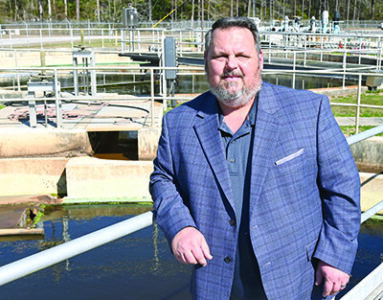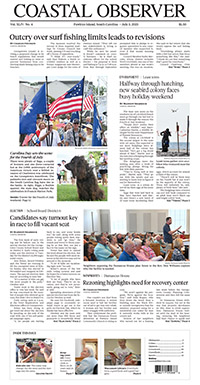Sales tax
Utility’s new director preparing projects for share of sales tax

Tommie Kennedy has heard a steady stream of requests for new projects since he took over as executive director of Georgetown County Water and Sewer District at the start of this month. His selection by the utility’s board in December coincided with Georgetown County’s creation of a Capital Projects Sales Tax Commission that will select projects for funding from the extra 1-cent tax if it is approved by voters.
Even though he wasn’t aware of the tax proposal when he applied to take over from Ray Gagnon, who retired after 11 years as director, “I made it clear to the board that we need to put infrastructure in the west side of the county,” Kennedy said. “It’s something we need to do.”
Now he has the opportunity.
In March, Kennedy plans to present the utility’s board with a list of projects to submit for funding to the sales tax commission. Two projects that the district has already developed will be on that list: a sewer project in the Sampit area and water and sewer expansion along Highway 701 in Plantersville. Together, those projects would cost about $27 million. A couple of other rural communities also want sewer, which would cost another $8 million and there are some that want to receive public water.
“Everyone has a need. If I had unlimited funds, everyone would get it,” Kennedy said.
The sales tax is estimated to generate $10 million a year and can be imposed for up to eight years. Water and sewer projects alone could take up about half the revenue, Kennedy acknowledged.
He will ask his board to prioritize their submission to the sales tax commission according to “what is most valuable to the county as a whole.”
Kennedy attended a meeting last week with representatives of other local, state and regional government agencies to review the application process and the criteria that the commission proposes to use to evaluate the requests.
Based on the proposed formula, water and sewer projects would get high scores for addressing a health and wellness need and, in some cases, improving an existing infrastructure problem. They would score well for having reliable cost estimates and little risk that they could not be completed. And because the utility has the funds to start a project if the referendum passes and collect the sales tax as reimbursement later, it would get a high score for implementation.
The sales tax commission also plans to grade projects on the ability of the entities to operate and maintain them once completed. The utility has an advantage there because the customers would pay for operations each month.
“That’s what we do,” Kennedy said. “We already have a way to pay for it.”
That can also be a drawback. “There are some people that just don’t want a $50 sewer bill. To a lot of people on the west side, $50 is a lot of money,” Kennedy said.
The district used to require that residents connect to sewer lines when they became available. In the case of projects built with grants, that was required to secure funding.
But the district changed that policy, so residents only have to pay for construction costs if the project is funded by property owners through an assessment. They can keep their existing septic tanks if they want. Only new construction is required to connect.
Funding a project through the capital projects sales tax would provide that same flexibility, Kennedy said.
“It’s a great way to put a lot of infrastructure on the west side of the county,” he said.
When Kennedy joined the utility 17 years ago, it was building new infrastructure. That came to a halt with the Great Recession. Under Gagnon, who took over in 2012 from the district’s long-time director Bob Barker, the focus shifted to rehabilitation and replacement of existing infrastructure.
“Ray had a great plan,” Kennedy said.
With a degree in electrical engineering from Clemson University, Kennedy started work with the district’s control systems. He later moved to the civil engineering side and into administration, earning an MBA along the way.
“A lot of engineers don’t make good managers,” Kennedy said.
He describes himself as a “people person,” which he said allows him to get to know the staff for whom he is now responsible.
“You’ve got to have a real relationship with everyone you want to lead,” Kennedy said.
Along with developing projects for the sales tax commission, which set an April 1 deadline for submissions, the district is in the process of expanding its surface water treatment plant on Sandy Island Road. Its current capacity is 8 million gallons a day, which it draws from the Waccamaw River. That’s the same capacity it had when Kennedy started with the district.
“Our demand has increased a lot in the last five or six years,” he said.
The upgrade will take the plant to 10 million gallons a day and allow a future upgrade to 12 million gallons.
While the infrastructure is necessary for growth, that growth isn’t something the district promotes. “We try to anticipate it,” Kennedy said.
For people in the rural parts of the county, that anticipation fits in with the needs of current residents.
“The greatest thing about this job is when I can truly get to help people,” he said. “It’s frustrating when we can’t.”




